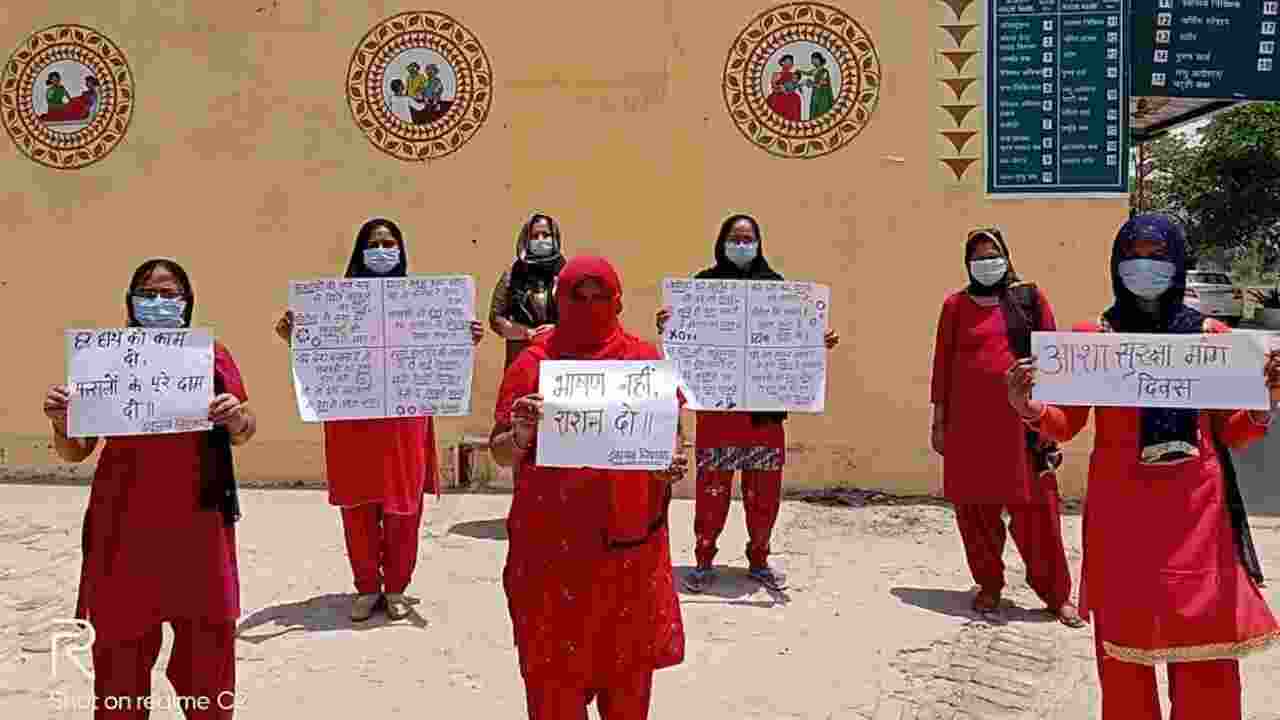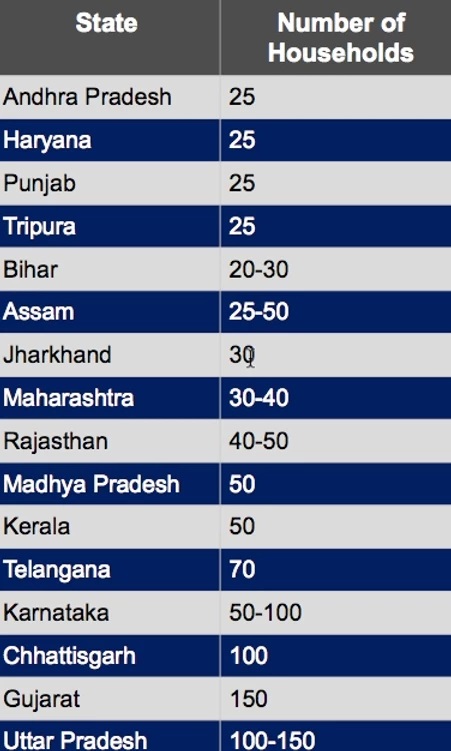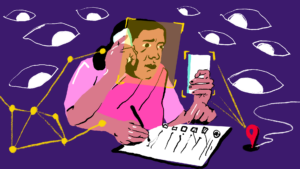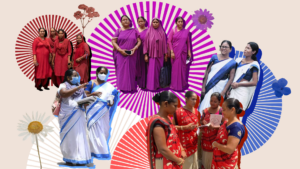Anger, Distress Among India’s Frontline Workers In Fight Against Covid-19
Without them, it would be impossible to track, test and monitor Covid-19 patients across India’s villages and cities. But over a million women health workers must now work with minimal protection, frequent abuse and attacks.

ASHAs in Haryana protest for better pay & testing facilities during the Covid pandemic./HARYANA ASHA WORKERS UNION
Mumbai/Hyderabad: It was 9 pm. Lakshmi Singh had just settled for dinner after an exhausting day in the field when she was summoned by the sarpanch. A group of migrant workers who had walked for several days had just entered her village, Raniya in the north eastern district of Bhind in Madhya Pradesh. Leaving her dinner midway, she rushed to place them under mandatory quarantine.
“A doctor’s job begins only after we have monitored every person in our community and identified people with symptoms,” said Lakshmi. “Yet, when the doctors come into the village they are in full gear, looking like robots, while we are not even given a mask.”
The 40-year-old, an Accredited Social Health Activist, or ASHA, among the over one million women health workers who serve as a crucial interface between India’s community and public health delivery, recording births, providing information on nutrition and supplying the government with critical on-ground health data.
In a 16-state survey, from Kerala to Tripura, ASHA workers—who now routinely clock over 12 hour days and are on call the rest of the time—reported feeling alienated and undervalued for the disproportionate burden they now bear in India’s battle against Covid-19, which by 8 June 2020 had claimed 7,135 lives and infected 256,611 people.
Over the next 14 days, Lakshmi would visit the workers in the quarantine centre in the village twice a day to monitor for any symptoms of Covid and report to the Public Health Center (PHC); and conduct door-to-door surveys of between 25-50 households a day to check for symptoms, especially among older persons, those with heart conditions and respiratory issues, tuberculosis patients, pregnant women and other high-risk populations and report positive cases to the PHC wearing only a handkerchief over her nose and mouth.
BehanBox, a digital platform for gender data and stories, conducted in-depth interviews with 52 ASHAs and ASHA union presidents across 16 states including Kerala, Karnataka, Andhra Pradesh, Telangana, Madhya Pradesh, Chhattisgarh, Rajasthan, Gujarat, Maharashtra, Punjab, Haryana, Uttar Pradesh, Bihar, Jharkhand, Tripura and Assam.
State governments are extracting crucial labour from ASHAs without adequate protection or, for that matter, economic compensation for putting their own and their families lives under physical risk and mental stress, the survey found.
Lives At Risk With Inadequate Safety Gear
“Everyday I live with the anxiety that I may infect my young kids,” said Champaben Rathwa, an ASHA from Sonagadh in Bhavnagar district of Gujarat. ASHAs across states are suffering from severe stress and anxiety about being infected and infecting families. While reports of ASHAs testing positive have emerged in Gujarat, Madhya Pradesh, Haryana, ASHAs say that if proper tests were conducted, many more would be found positive.
Governments have been sending ASHAs to the field without even minimal safety gear of masks, gloves and sanitisers. For the first 20 days, when India suffered a huge shortage of personal protective equipment (PPEs), ASHAs made do by covering their faces with handkerchiefs and dupattas.
“Government asked us to kick open the gates of people’s houses with our legs,” said Ranjit Kaur, an ASHA from Ropar in Punjab.
Even when masks became available, they were mostly appropriated by higher level healthcare staff. ASHA unions from across states made several representations to their governments to make PPEs available but to no avail.
“The PHC staff asked us why we needed masks at all. ‘Are you touching Covid positive patients?’ After a point we had to stop asking because they said we were making excuses for shirking away from our duty,” Pochamma, an ASHA from East Godavari district in Andhra Pradesh said.
ASHAs across states told us that every higher level official believes they are undeserving of any protective gear.
The central government in an 20 April 2020 directive asked states to provide all ASHAs with PPE kits, but that has not happened. In recent weeks, ASHAs in some states have received five disposable masks and one sanitiser each for the month. This lasts them, at most, 10 days. Many are spending their own money to buy sanitisers. ASHAs across states told us that the few masks that the governments distributed were mainly given to those working in urban areas where media is present.
“Why can’t corporates and big NGOs give us PPE kits instead of donating to the Chief Minister and Prime Minister Care Fund. Everyone wants to please the political bosses rather than care for our lives,” said Lakshmi, the ASHA from Madhya Pradesh.
ASHAs have also been demanding testing for themselves for the fear of infecting their families. They are also demanding separate quarantine facilities. Recently, one ASHA from Dukheri in Ambala district of Haryana made a video (see below) of the filthy quarantine facility she was placed in along with 21 men and just one toilet, while a doctor was quarantined in a civil hospital in the Ambala Cantonment area. After a day’s protest and suspension of work by the ASHAs, the government of Haryana assured them that they would be given equal treatment opportunities in the future.
As the pandemic rages, there are fears of an impending mental health crisis due to the mental anxiety and physical exhaustion suffered by ASHAs, early signs of which are already visible. Discrimination and stigma they face from their neighbours and extended families due to their community contact is causing a lot of mental agony.
“We are called ‘Corona walas’ (Corona carriers) and kept at a distance by our neighbours because we are in touch with community members without proper protective gear”, said Minara Begum, an ASHA from Kamrup district in Assam. “We are paying the price in our community for the government’s inability to keep us safe”, she says.
Tutumoni Lahon, another ASHA from Guwahati, Assam recalled an incident where another ASHA proudly shared a picture of her wearing a PPE given by the doctor on Covid duty. The Block level accountant of the National Health Mission, however, reprimanded her for wasting a valuable PPE.
“PPEs are valuable,” said Lahon. “And an ASHA’s life is not?”
The Job That Keeps Getting Harder
ASHAs were recruited as a volunteer cadre in 2005 under the National Health Mission as an interface between the community and India’s public healthcare system to improve community health. Often coming from very poor households and marginalised communities like Dalits and Adivasis, ASHAs have been instrumental in not just improving crucial maternal and child health indicators but collecting important data that underpins the healthcare system.
ASHAs in most states, except Andhra Pradesh, Kerala, Karnataka, Haryana, West Bengal and Sikkim, do not get a fixed honorarium. They are entitled to Rs 2,000 a month set by the central government, conditional on completing a set of eight core tasks: organising Village Health and Nutrition Days and convening the Village Health, Sanitation and Nutrition Committee every month, listing and updating household data every six months, maintaining a record of births and deaths, preparing child immunisation lists every month and updating lists of newly married couples.
They earn incentives for other tasks: one rupee for every Oral Rehydration Solution (ORS) packet distributed and Rs 300 for each institutional birth and antenatal care.
Over time, governments started adding to their work, some of this outside the remit of healthcare such as conducting election surveys and civic duties, without any additional remuneration. They were supposed to work for 2-3 hours a day, according to the Parliamentary Committee On Empowerment Of Women titled ‘Working Condition Of ASHAs’ (2009-10), but over the years work hours of ASHAs have stretched to more than eight hours a day.
During the pandemic, governments extended this policy of limitless unpaid work.
ASHA workers must now educate people about the precautionary measures they should take and aid the healthcare system in containing the Covid pandemic. They screen and monitor households in their community for Covid symptoms. They perform contact tracing and report information. They help with testing. They have also been tasked with non Covid-19 essential services mandated by the Ministry of Health and Family Welfare, such as delivering medicines, home visits to the elderly, and ensuring critical care for those on dialysis and requiring blood transfusions.
These tasks come above 66 tasks expected of them, such as antenatal and home-based postnatal care, immunisation, family planning services, adolescent health care, and routine checks for communicable and non communicable diseases.

Underprepared Healthcare System, Overburdened ASHAs
The public healthcare system was underprepared for the pandemic that unfolded in March. It fell to the ASHAs to ensure that the community remained safe and PHCs were not overburdened. ASHAs have since then been on around-the-clock Covid duty, while also cooking, cleaning and looking after their own households.
ASHAs in Andhra Pradesh and Telangana told us that from the early days of March, they were monitoring quarantined people who had returned from overseas, migrant labour and lorry drivers for up to four times a day—on foot, in temperatures that have reached 46 degrees this summer, as all transport facilities were shut during the lockdown. This was particularly difficult in urban areas, where they had to walk up to 5 km a day.
In states like Karnataka and Kerala, village-level task forces composed of ASHAs, anganwadi workers and panchayat staff, shared the task of monitoring activities. But in most states, the burden entirely fell on the ASHAs. Every day, they continue to be directed to collect new information and data by the Auxiliary Nurse Midwives (ANMs), a cadre of community health workers based in the health sub centres responsible for monitoring the ASHAs and other PHC staff. ASHAs in Haryana are currently conducting a eleventh round of survey where they are collecting data on pregnant women for a mandatory Covid testing announced by the government.
“We were not given any training for this work. We had to learn everything either from social media or television,” Noni, an ASHA worker from Dibrugarh in Assam told us. ASHAs had not only to self-train themselves but dispel misinformation in the villages due to the lack of credible information.
ASHAs were particularly unhappy about the fact that the Covid-19 workload is eating into their core activities, such as maternal and child healthcare, systems that they have built over the years within the community.
“Everything is about Corona these days,” complained Sunita Rani, an ASHA from Sonepat in Haryana and president of the Haryana ASHA workers union. “Today, we are not even able to visit newborn babies for fear of infecting them. My worry is that all our hard work all these years will amount to nothing and the clock will roll back if we don’t pay attention to maternal and child health.”
Abuse And Attacks In The Line Of Duty
Suman, 17, of Haryana’s Butana Kundu village was hit by a man with a steel pipe right inside her own home. All because her mother Usha, who works as an ASHA in the village pasted a quarantine sticker outside his home since he came back from outside the village.
For two days,Usha, a widow and mother of 3 children, took a barely conscious Suman to three Post Graduate Institute of Medical Education & Research (PGI) hospitals at Gohana, Khanpur and Rohtak where she was denied medical attention. She even had to arrange for a private ambulance at her own expense.
It was only after desperate appeals by the Haryana ASHA Workers Union and a very public outcry on social media, did she receive any medical attention.
“Even after serving my people, my country, this is what I get. Barely any money, no protection, an injured child. I’ve failed as a mother and the health ministry has failed me,” Usha told Firstpost.
ASHAs and their family members across states have been targets of verbal abuse and physical attacks in the line of duty.
“Attacks on ASHAs from Dalit communities in Haryana are high especially from the landed community strongmen as a means to assert their caste supremacy once again”, said Surekha, general secretary of the Haryana ASHA workers union in a webinar conducted by Women in Global Health.
ASHAs across Bengaluru, Gulbarga, Bagalkot, Chikaballapur and Belgaum districts of Karnataka were attacked by community members while on Covid-19 duty. “We have collected information on at least 50 attacks on ASHAs and anganwadi workers. They are rising everyday in Karnataka. Government needs to make necessary physical safeguards for them,” said S Varalakshmi, the president of the Karnataka ASHA union.
As a cadre that almost always dealt with women in the village in pre-pandemic times, ASHAs are finding it difficult to get men to listen to even simple instructions like maintaining physical distancing norms.
“The men are very rude to us. When we ask women who congregate near the village temple, they listen to us. But when men gather in village choupals, we have had to ask for help from the police to disperse them because they won’t listen to us,” said Sunita.
The Government of India in an ordinance promulgated on 24 April modified the Epidemics Act, 1897 to punish those guilty of attacks on healthcare workers.
Why ASHAs Feel Invisible
“Everyday we hear social media messages that say ‘Corona yodha ka karein samman’ (respect the Corona warriors),” asked Sunita Rani, an ASHA from Haryana. “Who are these Corona warriors? Only doctors and police? Are we not Corona warriors? Why are we invisible to the state?”
ASHAs have always, even before the pandemic, struggled to get respect and recognition for their work.
“We are like worms in the eyes of our higher officials because we come from poor families and have studied only upto 10th grade,” said Pochamma from Andhra Pradesh. “Sometimes, ASHAs struggle to maintain records. They shout at us and call us incomptetent. Just because we struggle with writing sometimes, does it make our work any less important?”
For several years, ASHAs have been demanding to be included within the cadre of permanent healthcare staff with a fixed pay of 18,000 per month along with social security and maternity benefits, fixed tasks and work hours.
Only when they are considered an integral part of the healthcare system with proper rights and benefits will their exploitation stop, they say.
In Haryana, ASHAs began to be paid a fixed salary of Rs 4,000 in 2018 following a seven-month long protest. In Andhra Pradesh, ASHAs waged a 10-year-long relentless struggle for fixed wages after which the current Chief Minister Y.S. Jagan Mohan Reddy set a monthly salary of Rs 10,000. But this has led to a different set of problems of ASHAs in the state.
“Our harassment has increased after we began getting the Rs 10,000 salary,” said Pochamma. “PHC staff now ask us what work do we do to deserve the salary? But if we stopped work, the entire healthcare system would collapse.”
ASHAs across states are upset that during the pandemic not a single official from the district medical health officer (DM&HO) to the health minister and chief minister has so much as acknowledged the role of ASHAs for their efforts in the pandemic. State governments have not sent any replies to the several written representations they have made for proper protective equipment.
“Forget recognition, none of the reports we collect are signed by us,” said Lakshmi. “They are forwarded as reports of the Auxiliary Nurse Midwives (ANMs). Tomorrow when any audit of this pandemic is conducted, our work and contribution will remain invisible.”
This is Part 1 of a three-part series.
This reportage was supported by the Thakur Family Foundation. The Thakur Family Foundation has not exercised any editorial control over the contents of this reportage
(This series was produced in collaboration with Article14 )
We believe everyone deserves equal access to accurate news. Support from our readers enables us to keep our journalism open and free for everyone, all over the world.




